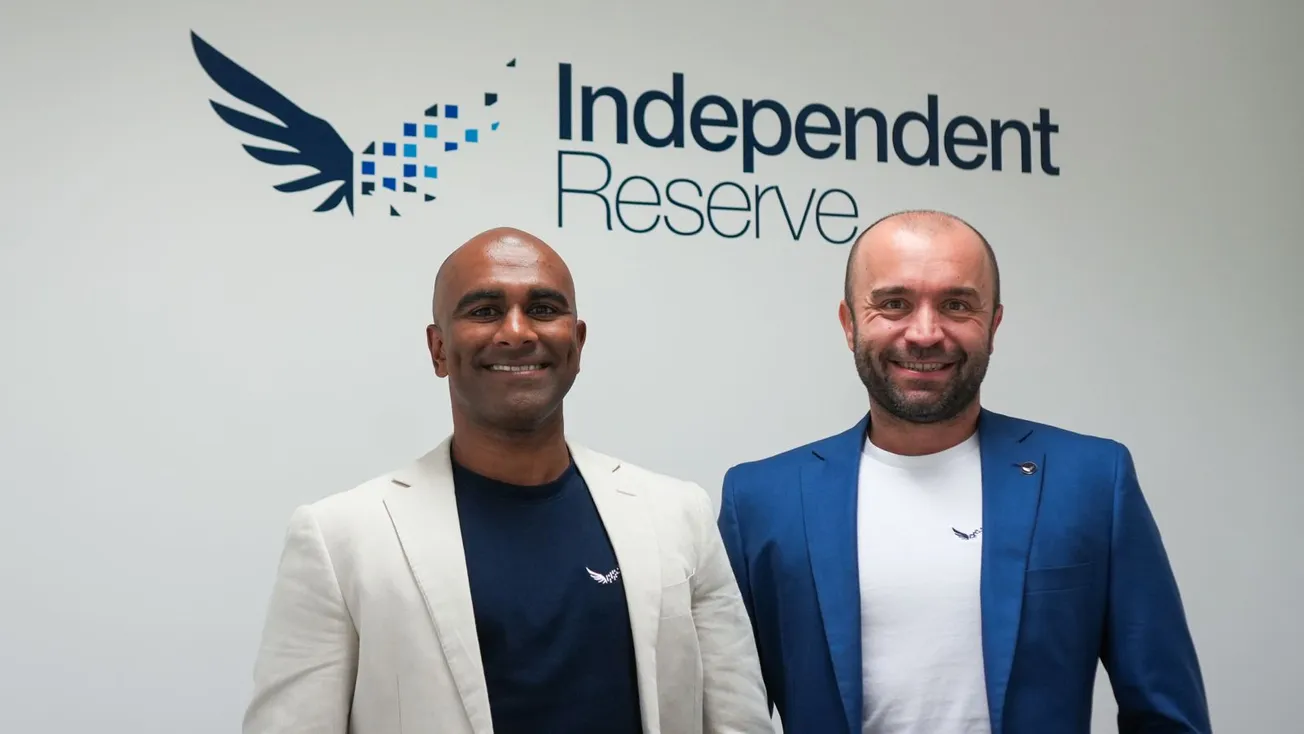Table of Contents
As one of the oldest crypto exchanges in APAC, Independent Reserve's legacy has cemented its reputation as a true industry OG.
Founded in 2013 and serving 350,000 customers globally, Independent Reserve was the first exchange licensed by the Monetary Authority of Singapore (MAS), and caters to both individual and institutional investors.
To learn more about the exchange and market developments in Singapore, Blockhead sat down with co-founders Adrian Przelozny and Lasanka Perera. Przelozny serves as the group CEO and actively promotes responsible innovation and clear regulatory frameworks. Meanwhile, Perera serves as the CEO of Independent Reserve Singapore, playing a pivotal role in steering the firm to become one of the leading crypto exchanges in the Asia Pacific region.
Impact of Market Developments
The past year has seen a significant influx of traditional finance entering the digital asset space, largely driven by an insatiable appetite for crypto ETFs. For Independent Reserve, this shift only reinforces their mantra.
"I think it validates a thesis we've held for a long time—that cryptocurrency is becoming a more mature asset class," said Przelozny. "The introduction of ETFs proves that allowing more investors to participate in the space, particularly those who might not have felt comfortable holding the crypto assets directly."
Przelozny added that ultimately it's good business for crypto exchanges. "As these investors get exposure to prices through ETFs, and as they become more curious about the underlying assets, they're more likely to open accounts on exchanges like Independent Reserve," he explained. "Overall, it's a good thing to grow the market and a positive development for the cryptocurrency market."
However, the institutional wave has seen an adjustment in behaviour. "In the short term, though, underlying token purchases on exchanges are a little bit lower," Perera said. "Some institutional investors, especially in wealth management, prefer transacting with ETFs. It's easier for them in terms of reporting and investment mandates. This trend has also made Bitcoin more correlated with US tech stocks."
Nonetheless, Perera believes it's a positive step for crypto, which could inspire more products in the future. "More ETF products will come—next, we could see Solana ETFs, basket ETFs, inverse ETFs or even a derivatives market," he said. "All of these will improve liquidity and bring more users into the space. Over time, I expect the volatility of Bitcoin will decrease as liquidity improves."

From a client perspective, Independent Reserve has observed less reluctance to diversify into crypto. "Over the past few years, we've seen more interest from family offices and wealth management firms," Perera recalled. "There's much less hesitation now than there was before. A few years ago, managers were still sceptical about cryptocurrency, but now it's seen as a legitimate, mainstream asset class. The question isn't whether Bitcoin will go to zero—it's about how big their allocation will be."
"It’s really opening up new market segments that weren't available in the past. So, we can now be in more rooms and have more open and diverse conversations about crypto," Przelozny added.
Singapore & Beyond
Based in Singapore and Australia, Independent Reserve has established a solid understanding of the APAC region.
Reflecting on obstacles facing specific markets in the region, Perera said, "There are some specific factors in the Hong Kong market. Hong Kong investors have been investing in crypto for a long time, especially big money. They've been involved in Bitcoin mining for a long time."
"The institutional side of Hong Kong has been accessing the US. ETFs, so there hasn't been much need for a Hong Kong-listed ETF. It’s not that Hong Kong participation is low; it's just that investors there prefer the U.S. ETFs," he continued.

With this in mind, Perera strongly believes that US ETFs will dominate because the market is "the most regulated, transparent, and liquid."
"The big issuers, like BlackRock, are there, so the demand for local ETFs would be lower," he said. Przelozny added that there was a similar trend in Australia with ETFs listed on the ASX. "The demand just wasn’t there," he said. "It’s difficult for an ETF to differentiate itself from another since the products are so similar. They could compete on fees, but fees are already quite low."
"If they innovate, for example by offering a basket of currencies, it could work. But if it’s just the same product as the U.S. ETFs, investors will likely stick with the U.S. options."
Nonetheless, Perera still sees the value in more localised ETFs. "If Singapore ever listed an ETF, for example, you could access it during Singapore trading hours, in SGD, and with faster local settlement," he explained.
Evaluating Market Trends
As the market adapts to new products and regulations, displaying a shift in behaviour, Perera said that the "biggest impact we’ve seen is larger investors coming to our platform."
"As the market grows and the asset gains legitimacy, there are just more people investing, which benefits the entire industry," he continued.
With this in mind, Bitcoin still faces pressures preventing it from maintaining momentum ever since it reached its all-time-high earlier this year.
"US inflation and the upcoming election are key factors," Perera explained as key market drivers. "The election is a big event that’s hanging over the ecosystem. Once we get past the election, I think the market will focus on other macro factors like interest rates, equities, and Bitcoin’s supply fundamentals."
Przelozny also highlighted the hysteria around "Uptober" - the cyclical expectation that prices will rise in October. "People think crypto will rise in October because it has in the past, so that expectation may drive the price up," he said. "We’re quite bullish on Q4 of this year and Q1 of 2025."
However, in the long run, Przelozny believes that the US election won't have a major impact on crypto. “Historically, markets rise regardless of who's in office. Presidents have far less influence on markets than many think," he said.
"As the market matures, things will change. Once the market reaches a certain size and level of investment, it becomes too big to stop, regardless of who is in office. You know, it might happen a bit faster depending on who's in office, but the end result will likely be the same. It’s just a question of getting there sooner than expected. But overall, I think it's mostly a distraction."
Perera agreed but still highlighted the impact of making crypto a major election agenda, which has sparked widespread interest. "That really put Bitcoin in the spotlight, making it a major political issue for both parties. If you take a broader view, that's a huge development. From this point forward, the U.S. will likely take more constructive steps, and globally, we’re seeing key economies move forward," he said.
"People are realising crypto is becoming a bigger part of their wallets and mindshare. So, yeah, I see it advancing. Regarding interest rates, we saw the dot plot, which is the 12-month forecast from central bankers in the U.S. They anticipate up to a 150 basis point rate cut over the next year, creating favourable liquidity conditions for Bitcoin and the broader crypto market."
Nonetheless, Perera said that despite all the noise, "Bitcoin is still a product with real product-market fit."
"It’s probably approaching half a billion users globally if you look at all the wallets and exchange accounts. That’s significant—if there are 5 billion internet-connected users in the world, Bitcoin is reaching close to 10% of them," he explained.
Additionally, Perera has also observed the proliferation of stablecoins: "Three or four years ago, the total market cap of stablecoins was around $3-4 billion. Now, it's about $170 billion."

"In 2022 alone, stablecoins moved $11.7 trillion in value, which is on par with Visa that year. About 25 million wallets hold stablecoins, with 20 million of those holding between $1 and $100. Additionally, 5 million wallets send and receive stablecoins weekly," Perera added.
In particular, stablecoins are helping smaller users, "particularly those who don’t have access to traditional financial services" to gain access to US dollars for the first time, he said.
"It's clear that these financial tools are benefiting the people who need them most," he continued. "Stablecoin issuers like Tether and Circle have proven business models. In fact, If you combine the U.S. Treasury holdings of Circle and Tether, they would rank among the top 20 holders of U.S. Treasuries globally. It’s a business that works from all perspectives—users get access to U.S. dollars, businesses enjoy the 5% interest carry, and even from a U.S. Treasury standpoint, it's favourable."
Regulatory Landscape
Independent Reserve prides itself on compliance with regulation. Regionally, the exchange believes that Singapore is still the most conducive to sustainable growth in the crypto space.
"The MAS (Monetary Authority of Singapore) is a forward-thinking and progressive regulator," Perera said. "Since the Payment Services Act was introduced a few years ago, the crypto ecosystem here has grown rapidly. We’ve just had the largest Token 2049 ever. Last year, there were 400 events with 40,000 attendees, and this year, it's even bigger."
Reflecting back on Independent Reserve's early days in 2013, Perera recalled how "there was stigma around the asset class and a lack of understanding." In response, Perera said the team "decided early on that building regulatory standards would help grow the industry." “We actively sought licenses, led with transparency, and aimed to set standards for the industry”, he added.
"We applied for an Australian Financial Services License back in 2013-14 and have always run our business with high transparency and governance, even before regulations were in place," he said, adding that it's been challenging in Australia "due to a lack of regulatory leadership, whereas Singapore has been more supportive."
Przelozny emphasised that "good regulation or bad regulation is debatable but the worst thing is no regulation."
"It creates uncertainty, and no one wants to invest in that kind of environment," he continued. "Once you know the rules, you can adapt and run your business accordingly. Most regulators don’t want to create bad rules; they want to consult with the industry to create a framework that protects stakeholders and helps the industry grow."
"In Australia, we've been working with the Treasury and government, but unfortunately, we’re still waiting for clear regulations, which we hope will come next year."
Branding & Market Positioning
From F1 to football, sports fans will be subconsciously familiar with a number of crypto exchange due to their brash sponsorships and partnerships. However, Independent Reserve has taken a more understated approach to branding. Perera said this move was an intentional one.
"Going big at a global event is one strategy, but we’re primarily a two-market exchange with an 11-year history in Australia and a few years in Singapore," Perera said. "We focus on corporates and work with licensed firms, so we use alternative methods to connect with our customers."
"Other exchanges may be global, multi-market players that can win retail business across different jurisdictions, so they can cast a wider net with different or fewer regulatory constraints. We’re in very strict markets. I think there are two different approaches."
He further explained that reaching clients in Independent Reserve's market requires deeper connections and interactions.
"In our markets, we deal with corporates and players in the wealth sector," he said. "The key strategies include participating in conferences and events, building goodwill within our networks, and providing thought leadership through research. We distribute this research through our networks, and we travel across Asia to connect with other Web3 ecosystems in countries like Japan, Korea, Thailand, and Malaysia.
"When these users come to Singapore, we can offer them a great experience. As a regulated exchange with top-tier banking in Singapore, we ensure a seamless user journey."
At Token 2049 in Singapore, Independent Reserve had a booth, which Perera said gave the exchange "a consistent presence throughout the conference, while still allowing us to attend external events."
Przelozny recalled how he enjoyed connecting with users at the booth and how "many people from Australia and Singapore told us how they've been using our platform since 2018. Hearing their feedback, both good and bad, was really productive."
In order to stay ahead of the competition, Perera said Independent Reserve retains a solid reputation through compliance, transparency, and governance. " With our 11-year history and proven track record, we've built a strong business in Australia based on transparency and corporate governance," he said.
"We’ve achieved many firsts, like being the first exchange regulated by AUSTRAC, the first to offer cold storage insurance in Australia, and the first to be ISO 27001 certified. We've built a sound business in a smaller market. Despite Australia only representing 2-3% of global trading volume, we’ve consistently ranked in the top 10-12 exchanges globally. This success is what led us to expand into Singapore, where we received the first license out of 170 applicants at that time. That trust factor is a huge deal for our customers."
Growth & Future Plans
Looking ahead, Independent Reserve is hoping to expand its user base. "Initially, we only onboarded Singaporean customers, but now we’re seeing growth from countries such as Malaysia, Hong Kong, Japan, and Korea," Perera said. "We’re guided by where our customers are coming from and learning about the Web3 ecosystems in those markets. In the coming year, we expect to enter one or two more jurisdictions."
Of course, this isn't without challenges, but Przelozny said that Independent Reserve's strength lies in recruitment. "Like any business, it’s all about the people," he said. "It’s hard to hire at the rate we need while maintaining a strong culture where everyone enjoys coming to work. Finding the right talent is always the hardest part, but it’s crucial because the wrong people can derail things. We take recruitment very seriously."

Perera added that "Scaling across markets involves understanding cultural nuances." For example, the culture that works in Australia won’t necessarily work elsewhere, he said.
"We need to adapt to win mindshare and connect with customers in new markets. So, that's something we've grown to learn. We're learning every day. "
Hey there! Just a quick note to let you know that this article is brought to you by Independent Reserve. Founded in 2013, Independent Reserve’s vision is to build the most secure and trusted way to buy Bitcoin and other cryptocurrencies. The exchange aims to transform cryptocurrency technology into secure, robust and regulated financial services, and do things the right way. Independent Reserve is the first crypto exchange to operate a licensed crypto exchange for all investors in Singapore. It is currently licensed by the Monetary Authority of Singapore (MAS) to provide Digital Payment Token (DPT) services under the Payment Services Act (PSA) 2019. So, please sit back, relax, and enjoy today's news, knowing that it's made possible by our friends at Independent Reserve.










